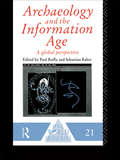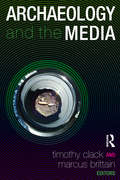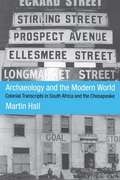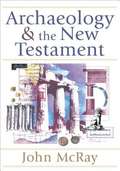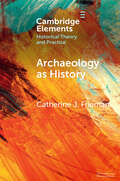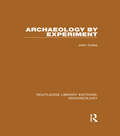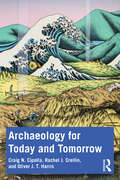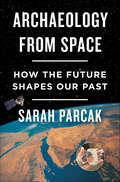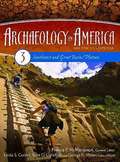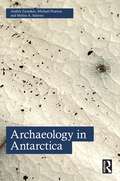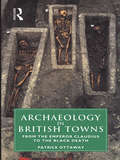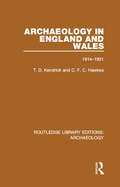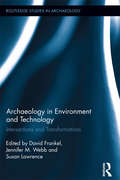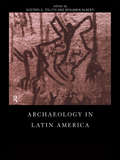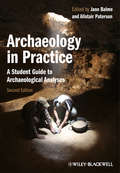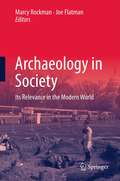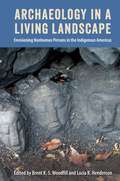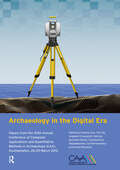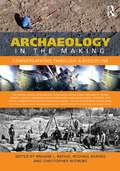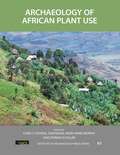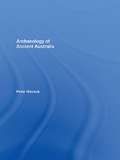- Table View
- List View
Archaeology and the Information Age (One World Archaeology)
by Paul Reilly Sebastian RahtzTraditional methods of making archaeological data available are becoming increasingly inadequate. Thanks to improved techniques for examining data from multiple viewpoints, archaeologists are now in a position to record different kinds of data, and to explore that data more fully than ever before. The growing availablility of computer networks and other technologies means that communication should become increasingly available to international archaeologists. Will this result in the democratisation of archaeological knowledge on a global basis? Contributors from Western and Eastern Europe, the Far East, Africa and the Americas seek to answer this and other questions about the way in which modern technology is revolutionising archaeological knowledge.
Archaeology and the Media (UCL Institute of Archaeology Publications)
by Timothy Clack Marcus BrittainThe public’s fascination with archaeology has meant that archaeologists have had to deal with media more regularly than other scholarly disciplines. How archaeologists communicate their research to the public through the media and how the media view archaeologists has become an important feature in the contemporary world of academic and professional archaeologists. In this volume, a group of archaeologists, many with media backgrounds, address the wide range of questions in this intersection of fields. An array of media forms are covered including television, film, photography, the popular press, art, video games, radio and digital media with a focus on the overriding question: What are the long-term implications of the increasing exposure through and reliance upon media forms for archaeology in the contemporary world? The volume will be of interest to archaeologists and those teaching public archaeology courses.
Archaeology and the Modern World: Colonial Transcripts in South Africa and Chesapeake
by Martin HallArchaeology and the Modern World advances a new controversial theory of historical archaeology. Using new case studies, Martin Hall evaluates the major theoretical traditions in historical archaeology while contributing significantly to the debate. In this study the author places an emphasis on material culture and the recent past to bring to light a picture of an unstable and violent early colonial world in which material culture played a crucial mediating role.
Archaeology and the New Testament
by John McRayAs he tours sites associated with the ministry of Jesus, the journey of Paul, and the seven churches of Revelation, he shows the pervasive influence of society, architecture, and religion on the peoples of the first century and on the New Testament.
Archaeology and the Senses
by Yannis HamilakisThis book is an exciting new look at how archaeology has dealt with the bodily senses and offers an argument for how the discipline can offer a richer glimpse into the human sensory experience. Yannis Hamilakis shows how, despite its intensely physical engagement with the material traces of the past, archaeology has mostly neglected multi-sensory experience, instead prioritizing isolated vision and relying on the Western hierarchy of the five senses. In place of this limited view of experience, Hamilakis proposes a sensorial archaeology that can unearth the lost, suppressed, and forgotten sensory and affective modalities of humans. Using Bronze Age Crete as a case study, Hamilakis shows how sensorial memory can help us rethink questions ranging from the production of ancestral heritage to large-scale social change, and the cultural significance of monuments. Tracing the emergence of palaces in Bronze Age Crete as a celebration of the long-term, sensuous history and memory of their localities, Hamilakis points the way to reconstituting archaeology as a sensorial and affective multi-temporal practice. At the same time, he proposes a new framework on the interaction between bodily senses, things, and environments, which will be relevant to scholars in other fields.
Archaeology and the Social History of Ships
by Richard A. GouldMaritime archaeology deals with shipwrecks and is carried out by divers rather than diggers. It embraces maritime history and analyses changes in shipbuilding, navigation and seamanship and offers fresh perspectives on the cultures and societies that produced the ships and sailors. Drawing on detailed past and recent case studies, Richard A. Gould provides an up-to-date review of the field that includes dramatic new findings arising from improved undersea technologies. This second edition of Archaeology and the Social History of Ships has been updated throughout to reflect new findings and new interpretations of old sites. The new edition explores advances in undersea technology in archaeology, especially remotely operated vehicles. The book reviews many of the major recent shipwreck findings, including the Vasa in Stockholm, the Viking wrecks at Roskilde Fjord and the Titanic.
Archaeology as History: Telling Stories from a Fragmented Past (Elements in Historical Theory and Practice)
by Catherine J. FriemanThis Element volume focuses on how archaeologists construct narratives of past people and environments from the complex and fragmented archaeological record. In keeping with its position in a series of historiography, it considers how we make meaning from things and places, with an emphasis on changing practices over time and the questions archaeologists have and can ask of the archaeological record. It aims to provide readers with a reflexive and comprehensive overview of what it is that archaeologists do with the archaeological record, how that translates into specific stories or narratives about the past, and the limitations or advantages of these when trying to understand past worlds. The goal is to shift the reader's perspective of archaeology away from seeing it as a primarily data gathering field, to a clearer understanding of how archaeologists make and use the data they uncover.
Archaeology by Experiment (Routledge Library Editions: Archaeology)
by John ColesExperimental archaeology is a new approach to the study of early man. By reconstructing and testing models of ancient equipment with the techniques available to early man, we learn how he lived, hunted, fought and built. What did early man eat? How did he store and cook his food? How did he make his tools and weapons and pottery? Such everyday questions, besides the more dramatic mysteries associated with the monuments of Easter Island and Stonehenge and the colonization of Polynesia, can all be explored by experiment.
Archaeology for Kids: Uncovering the Mysteries of Our Past, 25 Activities (For Kids Ser.)
by Richard PanchykThis activity book features 25 projects such as making a surface survey of a site, building a screen for sifting dirt and debris at a dig, tracking soil age by color, and counting tree rings to date a find, teaches kids the techniques that unearthed Neanderthal caves, Tutankhamun's tomb, the city of Pompeii, and Tenochtitlan, capital of the Aztec empire. Kids will delight in fashioning a stone-age tool, playing a seriation game with old photographs of cars, "reading" objects excavated in their own backyards, and using patent numbers to date modern artifacts as they gain an overview of human history and the science that brings it back to life.
Archaeology for Today and Tomorrow
by Oliver J. Harris Rachel J. Crellin Craig N. CipollaArchaeology for Today and Tomorrow explores how cutting-edge archaeological theories have implications not only for how we study the past but also how we think about and prepare for the future. Ranging from how we understand migration or political leadership to how we think about violence or ecological crisis, the book argues that archaeology should embrace a “future-oriented” attitude. Behind the traditional archaeological gaze on the past is a unique and useful collection of skills, tools, and orientations for rethinking the present and future. Further, it asserts that archaeological theory is not only vital for how we conduct our work as archaeologists and how we create narratives about the past but also for how we think about the broader world in the present and, crucially, how we envision and shape the future. Each of the chapters in the book links theoretical approaches and global archaeological case studies to a specific contemporary issue. It examines such issues as human movement, violence, human and non-human relations, the Anthropocene, and fake news to showcase the critical contributions that archaeology, and archaeological theory, can make to shaping the world of tomorrow. An ideal book for courses on archaeology in the modern world and public archaeology, it will also appeal to archaeology students and researchers in general and all those in related disciplines interested in areas of critical contemporary concern.
Archaeology from Historical Aerial and Satellite Archives
by Ioana A. Oltean William S. HansonHistorical archives of vertical photographs and satellite images acquired for other purposes (mainly declassified military reconnaissance) offer considerable potential for archaeological and historical landscape research. They provide a unique insight into the character of the landscape as it was over half a century ago, before the destructive impact of later 20th century development and intensive land use. They provide a high quality photographic record not merely of the landscape at that time, but offer the prospect of the better survival of remains reflecting its earlier history, whether manifest as earthworks, cropmarks or soilmarks. These various sources of imagery also provide an opportunity to examine from the air areas of Europe and beyond whose skies are still not open to traditional archaeological aerial reconnaissance. Tens of millions of such images are held in archives around the world, but their research potential goes very largely untapped. A primary aim of this volume is to draw to wider attention the existence, scope and potential access to historical archival aerial and satellite photographs, in order to encourage their use in a range of archaeological and landscape research. By drawing attention to this massive archival resource, providing examples of its successful application to archaeological/landscape questions, and offering advice how to access and utilise the resource, the volume seeks to bring this material to wider attention, demonstrate its huge potential for archaeology, encourage its further use and stimulate a new approach to archaeological survey and the study of landscape evolution internationally.
Archaeology from Space: How the Future Shapes Our Past
by Sarah ParcakWinner of Archaeological Institute of America's Felicia A. Holton Book Award • Winner of the Phi Beta Kappa Prize for Science • An Amazon Best Science Book of 2019 • A Science Friday Best Science Book of 2019 • A Kirkus Reviews Best Nonfiction Book of 2019 • A Science News Best Book of 2019 • Nature's Top Ten Books of 2019 "A crash course in the amazing new science of space archaeology that only Sarah Parcak can give. This book will awaken the explorer in all of us." ?Chris Anderson, Head of TEDNational Geographic Explorer and TED Prize-winner Dr. Sarah Parcak gives readers a personal tour of the evolution, major discoveries, and future potential of the young field of satellite archaeology. From surprise advancements after the declassification of spy photography, to a new map of the mythical Egyptian city of Tanis, she shares her field’s biggest discoveries, revealing why space archaeology is not only exciting, but urgently essential to the preservation of the world’s ancient treasures.Parcak has worked in twelve countries and four continents, using multispectral and high-resolution satellite imagery to identify thousands of previously unknown settlements, roads, fortresses, palaces, tombs, and even potential pyramids. From there, her stories take us back in time and across borders, into the day-to-day lives of ancient humans whose traits and genes we share. And she shows us that if we heed the lessons of the past, we can shape a vibrant future. Includes Illustrations
Archaeology in America: An Encyclopedia, Volume 3 Southwest and Great Basin/Plateau
by Francis P. McManamon Linda S. Cordell Kent G. Lightfoot George R. MilnerThis section of Archaeology in America includes essays about archaeological sites in the Southwest region of North America. The articles in the Southwest section of Archaeology in America include eleven general essays on topics that cover ancient or historic time periods. The general essays are followed by fifty-one essays on specific archaeological sites or about archaeological sites in a particular region.
Archaeology in Antarctica
by Michael Pearson Andres Zarankin Melisa A. SalernoArchaeology in Antarctica outlines the history of archaeology in the Antarctic and sub-Antarctic. The book details for the first time all past archaeological work in Antarctica, relating to both its use for conservation and research purposes, drawing on published, unpublished and oral information. This work has addressed historic and current scientific bases, explorers’ huts, whaling stations and sealing shelters. The ongoing and long-term research on the sealing shelters and sites in the South Shetland Islands features prominently. The archaeology enables new perspectives on the impact of global modernity and empire in the Antarctic and challenges established dominant discourses on the ‘heroic’ nature of human interaction with the continent. The work on sealing sites gives voice to the experiences of the sealer as a subaltern group previously largely overlooked by historical sources. This book will appeal to students and researchers in archaeology, history and heritage as well as readers interested in the human and historical aspects of Antarctica’s past and present.
Archaeology in British Towns: From the Emperor Claudius to the Black Death
by Patrick OttawayOver the last twenty-five years archaeology has revolutionised our knowledge of the early history of British towns. Based on his day-to-day involvement in urban archaeology, Patrick Ottaway reviews the important discoveries and research themes of this period, and considers how long-term urban research projects have revealed new information about towns and the lives of their inhabitants. The work of the urban archaeologist is examined in close detail, and attention is given to the critical problems of preserving our urban past, especially when the interests of archaeology and property development clash.
Archaeology in England and Wales 1914 - 1931 (Routledge Library Editions: Archaeology)
by C.F.C. Hawkes T.D. KendrickThis survey of work carried out over a number of years synthesises the progress of archaeology, showing at a glance the changes within less than quarter of a century on the interpretation of and reflection on knowledge in the area. Entertainingly, written, this is a lasting introductory account of important finds in English and Welsh archaeology, by two of the key researchers of the time. Heavily illustrated, this book showcases many artefacts as well as maps and plans, offering a wealth of information.
Archaeology in Environment and Technology: Intersections and Transformations (Routledge Studies in Archaeology #8)
by Susan Lawrence David Frankel Jennifer M. WebbEnvironments, landscapes, and ecological systems are often seen as fundamental by archaeologists, but how they relate to society is understood in very different ways. The chapters in this book take environment, culture, and technology together. All have been the focus of much attention; often one or other has been seen as the starting point for analysis, but this volume argues that it is the study of the inter-relationships between these three factors that offers a way forward. The contributions to this book pick up different strands within the tangled web of intersections between environment, technology, and society, providing a series of case studies which explore facets of this common theme in different settings and circumstances and from different perspectives. As well as addressing themes of theoretical and methodological interest, these case studies draw on primary research dealing with time periods from the late Pleistocene glacial maximum to the very recent past, and involve societies of very different types. Running through all the contributions, however, is a concern with the archaeological record and the ways in which scales of observation and availability of evidence affect the development of questions and explanations. The diversity of the chapters in this volume demonstrates the inherent weakness in any attempt to prioritise environment, technology, or society. These three factors are all embedded in any human activity, as change in one will result in change in the others: social and technical changes alter relations with the environment–and indeed the environment itself—and as environmental change drives changes in society and technology. As this book shows, it is possible to consider the relationship between the three factors from different perspectives, but any attempt to consider one or even two in isolation will mean that valuable insights will be missed.
Archaeology in Latin America
by Benjamin Alberti Gustavo G. PolitisThis pioneering and comprehensive survey is the first overview of current themes in Latin American archaeology written solely by academics native to the region, and it makes their collected expertise available to an English-speaking audience for the first time. The contributors cover the most significant issues in the archaeology of Latin America, such as the domestication of camelids, the emergence of urban society in Mesoamerica, the frontier of the Inca empire, and the relatively little known archaeology of the Amazon basin. This book draws together key areas of research in Latin American archaeological thought into a coherent whole; no other volume on this area has ever dealt with such a diverse range of subjects, and some of the countries examined have never before been the subject of a regional study.
Archaeology in Practice: A Student Guide to Archaeological Analyses
by Jane Balme Alistair PatersonThis much-enhanced new edition of the highly accessible guide to practical archaeology is a vital resource for students. It features the latest methodologies, a wealth of case studies from around the world, and contributions from leading specialists in archaeological materials analysis. New edition updated to include the latest archaeological methods, an enhanced focus on post-excavation analysis and new material including a dedicated chapter on analyzing human remains Covers the full range of current analytic methods, such as analysis of stone tools, human remains and absolute dating Features a user-friendly structure organized according to material types such as animal bones, ceramics and stone artifacts, as well as by thematic topics ranging from dating techniques to report writing, and ethical concerns. Accessible to archaeology students at all levels, with detailed references and extensive case studies featured throughout
Archaeology in Society: Its Relevance in the Modern World
by Joe Flatman Marcy RockmanThe practiceof archaeology has many different facets: from academia, to government, tocultural resource management, to public media. Considering the place of archaeology in society means understanding the rolesthat archaeology has in the present day and a sense of the contributions thatit can make in each of these areas, both now and in the future. Archaeologistscome to the field to pursue a variety of interests: teaching, examininghistory, preserving the environment, or studying a specialized time period orinterest. The outside world has a number of other expectations of archaeology:preservation, tourism, and education, to name but a few. From a broad and varied background, the editors have compiled a rare group ofcontributors uniquely qualified to address questions about the current state ofarchaeology and its relevance in society. There is no single answer to thequestion of how the field of archaeology should develop, and what it can do forsociety. Instead,the authors in this volume lay out the many ways in which archaeology isrelevant to the present day - considering, for example, climate change, energyexploration, warfare, national identity, the importance of stories and how theyare told, and how and why opportunities to engage with the past throughmuseums, digs, television, classes, and the print media have the formsthey currently do - creating a state-of-the-art tool for archaeologists, policymakers and the public alike to understand the work of many in the fieldand address the challenges we all face.
Archaeology in a Living Landscape: Envisioning Nonhuman Persons in the Indigenous Americas
by Brent K. S. Woodfill Lucia R. HendersonRecognizing and incorporating Indigenous knowledge systems in archaeological studies of the Americas This book explores the diverse range of other-than-human persons that inhabited and affected the landscape of the ancient Americas. These case studies acknowledge what is often dismissed by Western scholars: that Indigenous communities have long recognized degrees of personhood in mountains, volcanoes, caves, springs, rivers, rocks, plants, archaeological sites, trees, and animals and that this worldview should be taken seriously in archaeological investigations, community relations, and interpretations. In Archaeology in a Living Landscape, contributors examine the role of nonhuman agents in the ancient world, from land management and tenure to economics, politics, migration, pilgrimage, trade routes, conquest, ethics, and philosophy. Chapters describe Tlingit cosmology, lightning beings and magnetism in the Minnesota River Region, linguistic approaches to animacy in the United States Southeast, nonhuman persons in the ancient Maya economy, and Lacandon Maya ritual landscapes. They investigate the role of quarries in the building of Inka huacas (sacred spaces or objects), clay procurement and Andean apus (powerful mountains), Amazonian animism in polychrome ceramics, and the built and unbuilt landscape of the Mapuche. An epilogue by Dakota elder James Rock highlights how Western academic discourse often diverges from the viewpoints of Indigenous subjects. The contributors to this volume use language accessible to readers of diverse backgrounds. They focus on the centrality of nonhuman persons in the lives of Indigenous communities, working to move away from Western biases to embrace and integrate Indigenous belief frameworks in their studies. Archaeology in a Living Landscape highlights the value of Indigenous knowledge systems not just as archaeological evidence but as a body of theory. Contributors: Steve J. Langdon | Lisa J. Lucero | Alexei Vranich | James Rock | Eleanor Harrison-Buck | Lucia R. Henderson | Nicola Sharratt | Patrick Ryan Williams | Bill Sillar | Brent K.S. Woodfill | Jacob J. Sauer | Margaret Spivey-Faulkner | Sigrid Arnott | Dianne Desrosiers | Joshua Feinberg | David Maki | Carolyn Dean | Alice Balsanelli | Joel W. Palka | A.C. Roosevelt | Dennis Ogburn
Archaeology in the Digital Era: Papers from the 40th Annual Conference of Computer Applications and Quantitative Methods in Archaeology (CAA), Southampton, 26-29 March 2012 (Computer Applications and Quantitative Methods in Archaeology)
by David Wheatley Patricia Murrieta-Flores Iza Romanowska Graeme Earl Tim Sly Angeliki Chrysanthi Constantinos PapadopoulosCAA is the foremost conference on digital archaeology, and this volume offers a comprehensive and up-to date reference to the state of the art. This volume contains a selection of the best papers presented at the 40th Annual Conference of Computer Applications and Quantitative Methods in Archaeology (CAA), held in Southampton from 26 to 29 March 2012. The papers, all written and peer-reviewed by experts in the field of digital archaeology, explore a multitude of topics to showcase ground-breaking technologies and best practice from various archaeological and informatics disciplines, with a variety of case studies from all over the world.<
Archaeology in the Making: Conversations through a Discipline
by Christopher Witmore William L. Rathje Michael ShanksArchaeology in the Making is a collection of bold statements about archaeology, its history, how it works, and why it is more important than ever. This book comprises conversations about archaeology among some of its notable contemporary figures. They delve deeply into the questions that have come to fascinate archaeologists over the last forty years or so, those that concern major events in human history such as the origins of agriculture and the state, and questions about the way archaeologists go about their work. Many of the conversations highlight quite intensely held personal insight into what motivates us to pursue archaeology; some may even be termed outrageous in the light they shed on the way archaeological institutions operate – excavation teams, professional associations, university departments.Archaeology in the Making is a unique document detailing the history of archaeology in second half of the 20th century to the present day through the words of some of its key proponents. It will be invaluable for anybody who wants to understand the theory and practice of this ever developing discipline.
Archaeology of African Plant Use (UCL Institute of Archaeology Publications #61)
by Chris J. Stevens Sam Nixon Mary Anne Murray Dorian Q FullerThe first major synthesis of African archaeobotany in decades, this book focuses on Paleolithic archaeobotany and the relationship between agriculture and social complexity. It explores the effects that plant life has had on humans as they evolved from primates through the complex societies of Africa, including Egypt, the Buganda Kingdom, southern African polities, and other regions. With over 30 contributing scholars from 12 countries and extensive illustrations, this volume is an essential addition to our knowledge of humanity’s relationship with plants.
Archaeology of Ancient Australia
by Peter HiscockThis book is an introduction to the archaeology of Australia from prehistoric times to the eighteenth century AD. It is the only up-to-date textbook on the subject and is designed for undergraduate courses, based on the author's considerable experience of teaching at the Australian National University. Lucidly written, it shows the diversity and colourfulness of the history of humanity in the southern continent. The Archaeology of Ancient Australia demonstrates with an array of illustrations and clear descriptions of key archaeological evidence from Australia a thorough evaluation of Australian prehistory. Readers are shown how this human past can be reconstructed from archaeological evidence, supplemented by information from genetics, environmental sciences, anthropology, and history. The result is a challenging view about how varied human life in the ancient past has been.
